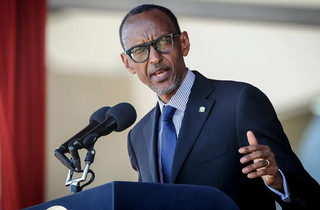The swearing-in ceremony, held at the 45,000-capacity Amahoro National Stadium in Kigali, was attended by several African heads of state and thousands of supporters.
While Kagame is credited with bringing stability and economic progress to Rwanda following the 1994 genocide, his administration is also accused of suppressing dissent and maintaining a repressive regime. Rights groups point to the overwhelming margin of his electoral victory as evidence of the lack of genuine democracy in the country. In the July 15 election, only two candidates were permitted to run against Kagame.
In his oath of office, Kagame pledged to preserve peace, national sovereignty, and unity in Rwanda. He vowed not to use his powers for personal gain, stating, "Should I fail to honour this oath, may I be subjected to the rigours of the law."
Kagame has been the de facto leader of Rwanda since his rebel forces took control at the end of the genocide, which saw the slaughter of around 800,000 ethnic Tutsis and moderate Hutus. Under his leadership, Rwanda has seen significant development, with Kigali becoming one of Africa’s cleanest cities and a hub for international events, including the African Basketball League and the Commonwealth Heads of Government Meeting in 2022.
However, Kagame's presidency has not been without controversy. He has been accused of destabilizing neighboring Democratic Republic of Congo (DRC) by allegedly supporting the M23 rebel group. A recent UN report claimed that 4,000 Rwandan troops were present in the DRC, further straining relations between the two countries. Notably, Congolese President Félix Tshisekedi did not attend Kagame's inauguration.
In his speech, Kagame criticized the DRC for its failure to address the Rwandan rebel groups operating within its borders, suggesting that mediation efforts would be futile without a change in the situation. His remarks indicated a continued firm stance on Rwanda's involvement in the DRC conflict. (ILKHA)



 Dünya
Dünya
 Güncel
Güncel
 Güncel
Güncel
 Dünya
Dünya
 Dünya
Dünya
 Güncel
Güncel
 Güncel
Güncel
 Dünya
Dünya
 Dünya
Dünya
 Güncel
Güncel





